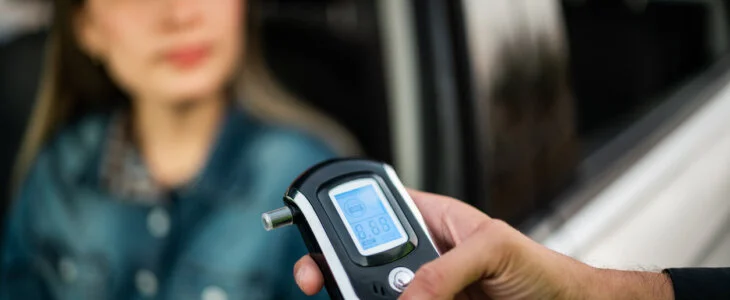As many drivers have found out the hard way, Massachusetts has very strong laws against drunk driving. Called operating under the influence (OUI), the law makes it illegal to drive a motor vehicle while drunk. This is why it is important to know what constitutes OUI when consuming alcohol, how a breathalyzer works, and what happens if you refuse such a test when you are pulled over by a law enforcement officer. If you are arrested and charged with OUI, you are going to need the assistance of an experienced Massachusetts criminal defense attorney.
What are the Legal Limits for Drinking in Massachusetts?
While you might think that the drinking limits are the same under Massachusetts law, a great deal depends on the circumstances of the case. The legal drinking age is 21, which means that bars, restaurants, liquor stores, and package stores cannot legally sell or serve beer, wine, spirits, or any other alcoholic beverages to anyone who is under that age. However, you can get a learners permit or driver’s license in Massachusetts starting at the age of 16. So, the Commonwealth has an interest in cutting down on underage drinking, which affects the legal limits for an OUI offense.
For drivers who are 21 years of age or older, anyone operating a motor vehicle with a blood alcohol content (BAC) of 0.08% or higher is considered to be OUI. This changes to 0.02% BAC for anyone under 21, as Massachusetts has a “zero-tolerance” policy for underage drinking. Considering the large number of colleges and universities in the Commonwealth, this makes a great deal of sense. There is one other thing to keep in mind for drivers who are 21 or older. If you hold a Commercial Driver’s License and are operating a commercial vehicle at the time you are pulled over, any BAC of 0.04% or higher is considered OUI.
What is a Breathalyzer?
The main way a BAC is determined is by using a breathalyzer. This device is used by law enforcement to measure the amount of alcohol on your breath. The law enforcement officer will ask you to blow into the breathalyzer, which has a sensor that detects alcohol. This is measured and then converted into a BAC.
There are a number of different devices. The roadside screenings are usually done using a preliminary alcohol screening device, which is less accurate than an evidential breath test, which are the ones that are used at a police station after a motorist has been taken into custody. These more accurate tests are the ones that get admitted into evidence. In addition, some use a fuel cell that creates a chemical reaction to test alcohol concentration, while others have an infrared light that can identify alcohol molecules. There are also breathalyzer devices that combine best tests for more accurate readings.
Can You Refuse a Breathalyzer in Massachusetts?
You have the absolute legal right to refuse a breathalyzer test administered by a law enforcement officer in Massachusetts. However, doing so will result in the immediate suspension of your driver’s license. The duration of such suspension will depend upon your age and whether you have ever been convicted of an OUI in the past. For example, drivers who are under the age of 21 may face a longer suspension.
A drivers license suspension for a first offense for refusal will typically last 180 days. A second refusal may result in three-year suspension. Any third or subsequent refusal can result in a lifetime revocation of your driving privileges. In addition, a court can fine you in addition to the drivers license suspension.
Under Massachusetts law, you are considered to have implied consent to take a breathalyzer test when asked to do so by a law enforcement officer by virtue of having a driver’s license. Therefore, you can be subject to consequences for any refusal to take the test. You can appeal the suspension, but the burden will be upon you to demonstrate why you should not be subject to consequences for your refusal. If you are arrested and charged with OUI, your refusal to take the breathalyzer test cannot be used against you as evidence of your guilt.
What Should You Do If You Are Arrested for an OUI?
While refusing a breathalyzer is not a criminal offense, if a law enforcement officer believes you are driving a motor vehicle OUI, he or she can still place you under arrest. Further, if you agree to take a breathalyzer and it shows your BAC is over the limit, you will likely be arrested. If this happens, you should provide the officer with your name, address, and phone number only. While you should be polite with law enforcement and refrain from resisting arrest, you should immediately invoke your rights under the law. This includes not having to answer questions, having the right to call an attorney to represent you, and refusing to take any tests, such as a breathalyzer or a field sobriety test.
Contact a Massachusetts Criminal Attorney Today
If you are charged with an OUI, then you are going to need an experienced criminal defense attorney to assist you. The attorneys at Geraghty Law LLC will provide you with the representation you need to protect your rights against any OUI charges. Contact us today for a consultation.



